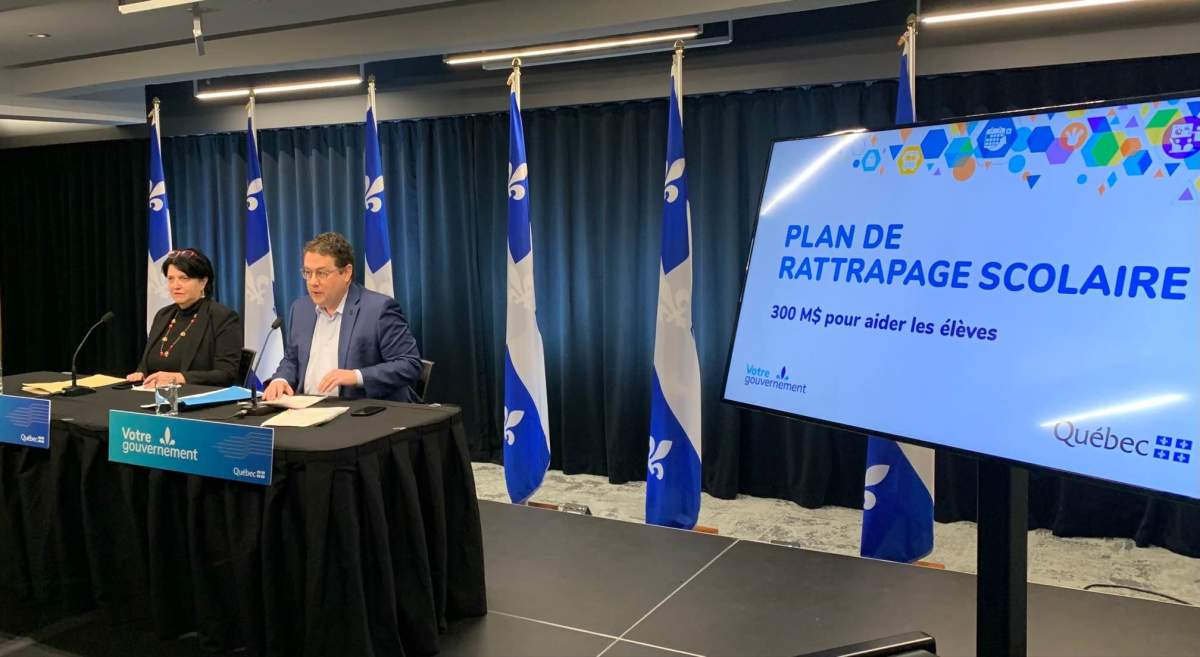Quebec’s public schools can stay open during March break to make up for lost class time — but it won’t be mandatory, the province’s education minister said Tuesday.

Bernard Drainville announced a $300-million plan to help students catch up after the labour conflict kept some children at home since late November.
As part of the measures, Drainville said school administrators can choose to keep schools open during March break but the government will let each school decide what is needed.
“We will not force anyone to do more work if they don’t want to,” Drainville said of teachers and other school staff, adding they will be remunerated for any additional hours of work.
Under the plan, the province will also push back upcoming report cards to the end of March to give students more time to catch up.
Ministerial exams scheduled for the end of the school year will also be rescheduled to give students more time to learn, but the exams still must be done by June 23. The exams will also be adjusted to count for less of the student’s final grade than originally planned.
Other measures include providing additional tutoring outside of class time and more support for students with special needs.
The province will also offer free summer school for Grade 10 and 11 students who fail their ministerial exams. The plan includes $42 million in emergency funding for educative organizations devoted to learning and curtailing student dropouts.

Get daily National news
“We need to do everything we can to help the students catch up and overcome the delays,” Drainville said.
The move comes after the provincial government reached tentative deals with major public sector unions just days before the new year, though they still have to be ratified by members.
One of those unions — the Fédération autonome de l’enseignement, or FAE — went on an unlimited strike on Nov. 23. The walkout shuttered some 800 schools for 22 days and kept about 368,000 students home.
Other schools were shuttered for 11 days sprinkled over several weeks as teachers represented by a different negotiating bloc held strike days of varying lengths.
Meanwhile, students in the private schools didn’t miss any class time.
When will the measures take effect?
Starting this week, Drainville said each school is expected to start evaluating what the needs are for their students to adequately catch up from the strikes.
Administrators will have a little under two weeks to decide what kind of — if any — additional tutoring and other services will be available.
Parents will then be contacted the week of Jan. 22 if schools determine their child could benefit from more support outside of the classroom.

Drainville said the goal is to offer additional tutoring and other measures by the end of the month, but he stressed that the government’s plan is meant to offer flexibility to each school since a one-size-fits-all approach across the province wouldn’t work.
“Taking the compulsory road would have been difficult for several reasons,” Drainville said.
It’s not up to him to force teachers to take on extra hours, Drainville added. He noted Quebec would have had to negotiate with each union in order to cancel March break — which dates vary by school — and keep schools open.
Drainville said the measures announced Tuesday should bring the students who missed more than a month of class time “up to par” with other kids in the province.
— with files from The Canadian Press



Comments
Want to discuss? Please read our Commenting Policy first.